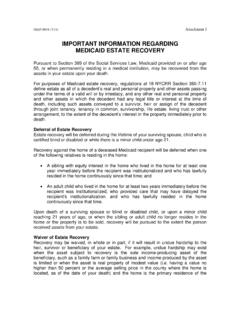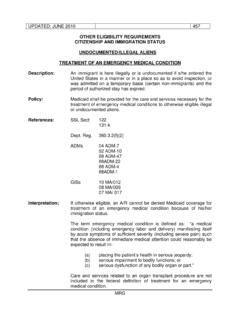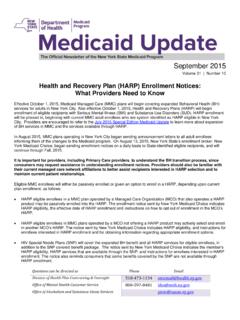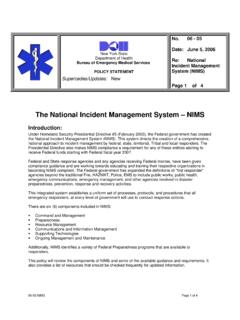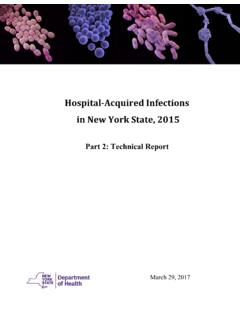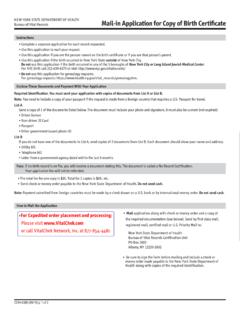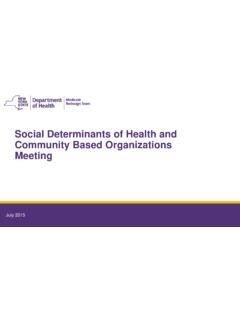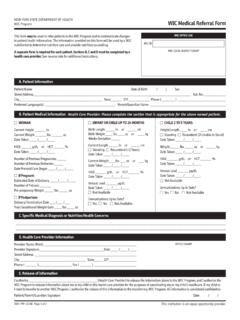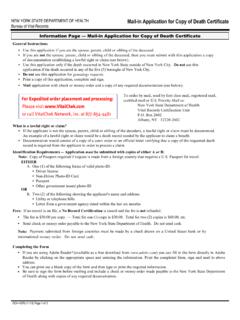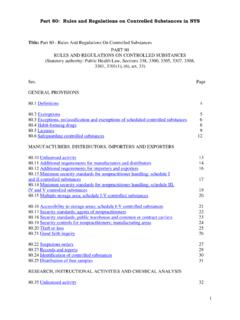Transcription of Medicaid Beneficiaries Cannot Be Billed - New York State ...
1 T H E O F F I C I A L N E W S L E T T E R O F T H E N E W Y O R K S T A T E M E D I C A I D P R O G R A M Medicaid Beneficiaries Cannot Be Billed This is a reminder to all hospitals, free-standing clinics and individual practitioners about the requirements of the Medicaid program related to requesting compensation from Medicaid Beneficiaries , including Medicaid Beneficiaries who are enrolled in a Medicaid managed care or Family Health Plus (FHPlus) plan, or who have been found to be presumptively eligible for Medicaid or the Family Planning Benefit Program (FPBP). By enrolling in the Medicaid program, a provider agrees to accept payment under the Medicaid program as payment in full for services rendered. A provider may not make a private pay agreement with a beneficiary to accept a Medicaid fee for a particular covered service and then provide a different upgraded service (usually a service that is beyond the scope of the Medicaid program) and agree to charge the beneficiary only the difference in fee between two services, in addition to billing Medicaid for the covered service.
2 It is an unacceptable practice to knowingly demand or collect any reimbursement in addition to claims made under the Medicaid program, except where permitted by law. ACCEPTANCE AND AGREEMENT When a provider accepts a Medicaid beneficiary as a patient, the provider agrees to bill Medicaid for services provided or, in the case of a Medicaid managed care or Family Health Plus (FHPlus) enrollee, the beneficiary s managed care plan for services covered by the contract. The provider is prohibited from requesting any monetary compensation from the beneficiary, or their responsible relative, except for any applicable Medicaid co-payments. The provider is prohibited from requesting any monetary compensation from pregnant women or children who have been found to be presumptively eligible for Medicaid or Beneficiaries found presumptively eligible for FPBP. A provider may charge a Medicaid beneficiary, including a Medicaid or FHPlus beneficiary enrolled in a managed care plan, only when both parties have agreed prior to the rendering of the service that the beneficiary is being seen as a private pay patient.
3 This agreement must be mutual and voluntary. It is suggested that providers keep the beneficiary s signed consent to be seen as a private pay patient on file. If, for example, a provider sees a beneficiary, and advises them that their Medicaid card or health plan card is valid, eligibility exists for the date of service and treats the individual, the provider may not change their mind and bill the beneficiary for that service or any part of that service. A provider who participates in Medicaid fee-for-service may not bill Medicaid fee-for-service for any services included in a beneficiary s managed care plan, with the exception of family planning services, when a provider doesn t provide such services under a contract with the recipient's health plan. -CONTINUED ON PAGE 4- New York State visit us online: www . FEBRUARY 2014 VOLUME 30 NUMBER 2 2 | P a g e February 2014 New York State Medicaid Update FEBRUARY 2014 NEW YORK State Medicaid UPDATE POLICY AND BILLING GUIDANCE Medicaid Beneficiaries Cannot Be Billed .
4 Cover Electronic Health Records (EHR) Incentive Program Update .. 2 Nursing Home Population and Benefit Transition to Medicaid Managed Care .. 6 Billing for Clients enrolled with Medicaid Coverage: .. 9 Providers Urged to Submit Correct Coordination of Benefits (COB) Information to Medicaid .. 10 PHARMAC Y UDPATE Mandatory Prospective Drug Utilization Review (Pro-DUR) .. 11 Update on Pharmacy Billing Procedures for Compounded Prescriptions .. 13 Medicaid Pharmacy Prior Authorization Programs Update .. 14 Coverage of Compounded Prescriptions for the Dual Eligible Population .. 16 Important Information on Ketamine use in Compounded Prescriptions .. 16 ALL PROVIDERS Medicaid and ICD-10 Implementation .. 17 Provider 19 IN THIS ISSUE .. Andrew M. Cuomo GOVERNOR State of New York Nirav R. Shah, , COMMISSIONER New York State DOH Jason A. Helgerson Medicaid DIRECTOR Office of Health Insurance Programs The Medicaid Update is a monthly publication of the New York State Department of Health.
5 3 | P a g e February 2014 New York State Medicaid Update 4 | P a g e February 2014 New York State Medicaid Update A provider who does not participate in Medicaid fee-for-service, but who has a contract with one or more managed care plans to serve Medicaid managed care or FHPlus members, may not bill Medicaid fee-for-service for any services. Nor may any provider bill a beneficiary for services that are covered by the beneficiary s Medicaid managed care or FHPlus contract, unless there is prior agreement with the beneficiary that they are being seen as a private pay patient as described previously. The provider must inform the beneficiary that the services may be obtained at no cost from a provider that participates in the beneficiary s managed care plan. Note: Due to the requirement that PRIOR agreement be made for reimbursement, Medicaid Beneficiaries may never be charged for services rendered in an Emergency Room (except applicable Medicaid co-payments).
6 CLAIM SUBMISSION Providers are strongly encouraged to confirm eligibility and the appropriate payor every time a patient is seen and before rendering services. Providers of long term services and supports are encouraged to confirm eligibility on the 1st and 15th of each month, and, as applicable, promptly contact a recipient s new managed care plan to ensure continued service authorization. The prohibition on charging a Medicaid or FHPlus recipient applies: When a participating Medicaid provider or a Medicaid managed care or FHPlus participating provider fails to submit a claim to Computer Sciences Corporation (CSC) or the recipient's managed care plan within the required timeframe; or When a participating Medicaid provider or a Medicaid managed care or FHPlus participating provider submits a claim to CSC or the recipient's managed care plan, and the claim is denied for reasons other than that the patient was not eligible for Medicaid or FHPlus on the date of service.
7 COLLECTIONS A Medicaid beneficiary, including a Medicaid managed care or FHPlus enrollee, must not be referred to a collection agency for collection of unpaid medical bills or otherwise Billed , except for applicable Medicaid co-payments, when the provider has accepted the enrollee as a Medicaid or FHPlus patient. Providers may, however, use any legal means to collect applicable unpaid Medicaid co-payments. -CONTINUED ON PAGE 5- POLICY AND BILLING GUIDANCE 5 | P a g e February 2014 New York State Medicaid Update EMERGENCY MEDICAL CARE A hospital that accepts a Medicaid beneficiary as a patient, including a Medicaid or FHPlus recipient enrolled in a managed care plan, accepts the responsibility for making sure that the patient receives all medically necessary care and services. Other than for legally established co-payments, a Medicaid or FHPlus recipient should never be required to bear any out-of-pocket expenses for: Medically necessary inpatient services; or, Medically necessary services provided in a hospital-based emergency room (ER).
8 This policy applies regardless of whether the individual practitioner treating the beneficiary in the facility is enrolled in the Medicaid program. When reimbursing for ER services provided to Medicaid managed care or FHPlus enrollees, health plans must apply the: Applicable federal and State law and regulation; Provisions of the Medicaid Managed Care/FHPlus Model Contract; and Department Directives. To avoid payment delays, hospitals are encouraged to query MEVS for a patient s current eligibility status and appropriate payor, before preparing an emergency Medicaid application. CLAIMING PROBLEMS If providers find a problem with a claim submission, they must first contact the CSC Call Center at (800) 343-9000. If the claim is for a service included in the Medicaid managed care or FHPlus benefit package, the enrollee's managed care plan must be contacted. Questions? Please call the Office of Health Insurance Programs at (518) 473-2160. POLICY AND BILLING GUIDANCE 6 | P a g e February 2014 New York State Medicaid Update Nursing Home Population and Benefit Transition to Medicaid Managed Care Pending Centers for Medicaid and Medicare Services (CMS) approval, beginning April 1, 2014, all eligible individuals age 21 and older in need of long term placement in a nursing facility will be required to join a Medicaid Managed Care Plan (MMCP) or a Managed Long Term Care Plan (MLTCP).
9 The MMCP benefit package will also expand to include long term nursing home services as this is already a benefit in MLTCPs. The steps toward this transition require that Managed Care Organizations (MCOs), providers and the State ensure that individuals in need of long term care services receive care in the most integrated and least restrictive setting by developing a patient centered care plan. For the purpose of this article, MCO means a MMCP and a MLTCP. Current long term placed Beneficiaries residing in a Medicaid certified skilled nursing facility (nursing home) on a permanent basis at the time of this transition will remain in fee-for-service Medicaid and will not be required to enroll in a MCO. Transition of Benefit Beginning April 1, 2014, the nursing home benefit will be included in the MMCP benefit package for plans operating in New York City, Nassau, Suffolk, and Westchester counties. Medicaid managed care enrollees entering a nursing home for long term placement after the applicable implementation date will receive the benefit through their current MMCP.
10 Enrollees will select a nursing home for long term placement from the plan provider network. In addition, individuals residing in New York City, Nassau, Suffolk and Westchester counties in need of long term nursing home services will be required to enroll in a MCO. The transition of the benefit and population will phase into additional counties beginning October 2014 for both dual and non-dual eligible populations, with all counties phased in by December 2014 (see revised phase-in schedule below). Beginning October 1, 2014, the State will allow Beneficiaries residing in a nursing home on a long term basis prior to April 1, 2014 in New York City, Nassau, Suffolk and Westchester counties to enroll in a MCO on a voluntary basis. Individuals residing in a nursing home in the remaining counties will be allowed to enroll in a MCO on a voluntary basis beginning January 1, 2015. MCOs are required to reimburse contracted nursing homes at either the benchmark rate (fee-for-service) or a negotiated rate that is agreed to by both parties.
